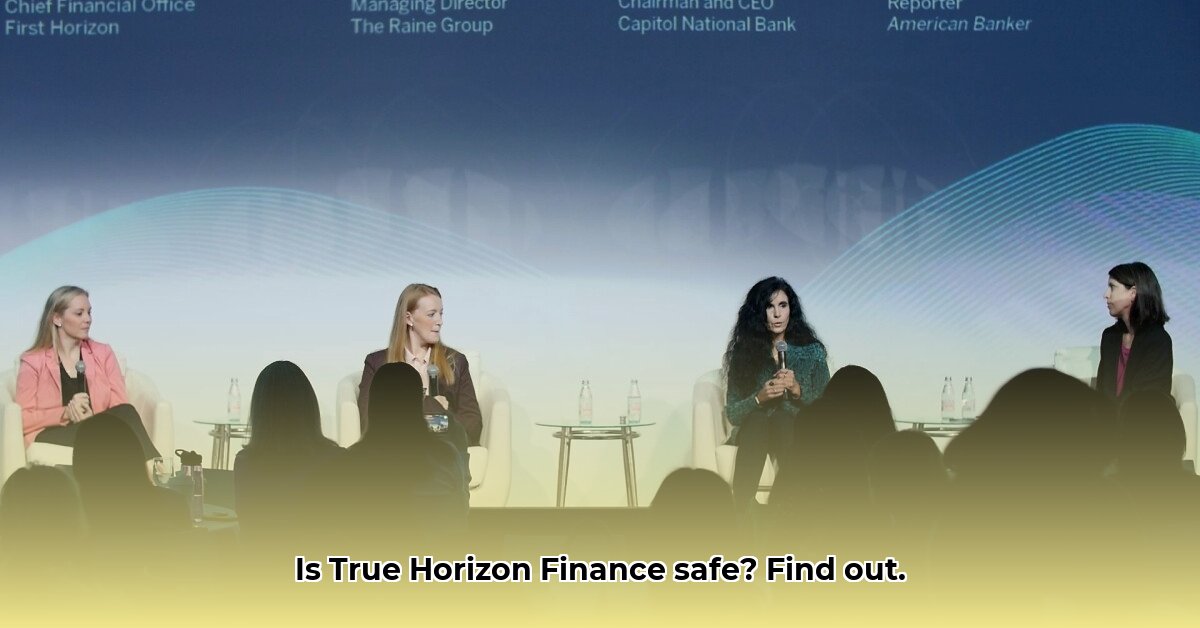
This review critically assesses True Horizon Finance, an online lending platform, identifying significant risk factors and raising serious safety concerns for potential borrowers. Our analysis reveals a concerning lack of transparency and numerous red flags, prompting a strong recommendation against using this service.
A Critically Low Trust Score: Extensive Risk Factors Identified
True Horizon Finance received an extremely low trust score of 7.8 out of 100, indicating a high-risk assessment. This alarmingly low score is based on 53 aggregated risk factors, each representing a potential problem for borrowers. This is not a minor issue; it signifies a substantial degree of risk. Such a low score should serve as a significant deterrent.
Questionable Affiliations and Network Associations: Cause for Concern
True Horizon Finance's online presence shows close links to other websites previously flagged as suspicious. While coincidental, this proximity warrants scrutiny. These connections raise doubts about the platform's trustworthiness and operational integrity. Further investigation is necessary to clarify these relationships and their potential implications.
High Incidence of Spam and Phishing Attempts: Significant Security Risks
A concerning number of spam and phishing attempts have been associated with True Horizon Finance. This suggests a high likelihood of malicious activities aiming to steal user data. The potential for email scams and compromised personal information represents a significant security risk to potential borrowers. The volume of reported incidents raises serious doubts about the platform's commitment to data security.
Marketing Discrepancies: A Gap Between Promises and Reality
True Horizon Finance's marketing materials portray a “smart, simple loan process.” However, this positive image starkly contrasts with the overwhelmingly negative reviews and the extremely low trust score. This significant discrepancy raises serious questions about the accuracy of the company’s marketing claims and the disparity between its advertised services and actual operational practices.
Opacity and Lack of Transparency: Critical Information Gaps
Transparency is paramount in financial transactions. True Horizon Finance lacks transparency regarding crucial aspects such as loan approval processes, affiliated lenders, interest rates, and associated fees. This opacity makes it impossible for potential borrowers to assess the full cost and potential risks involved. The absence of this critical information is alarming and further reinforces the high-risk assessment.
Protecting Yourself: Actionable Steps and Recommendations
Based on our analysis, we strongly advise against using True Horizon Finance. Instead, we recommend exploring established lenders known for their reputation, transparency, and robust security measures. Considering alternative, well-vetted options is crucial for mitigating financial risks.
Risk Assessment: A Summary of Critical Concerns
| Factor | Risk Level | Explanation |
|---|---|---|
| Website Security | Very High | Extremely low trust score and questionable affiliations indicate significant security vulnerabilities. |
| Data Privacy | Very High | High incidence of spam and phishing attempts points to a substantial risk of data breaches and identity theft. |
| Loan Process Transparency | Very High | Insufficient information on loan terms, lenders, and fees prevents accurate risk assessment. |
| Lender Vetting | High | Limited transparency regarding lender vetting processes suggests elevated risks for borrowers. |
Regulatory Gaps and the Urgent Need for Reform
The issues surrounding True Horizon Finance highlight the need for stricter regulations in the online lending industry. Increased oversight, clear guidelines, and proactive monitoring are essential to safeguard consumers from fraudulent activities and manipulative practices within the online lending sector.
How to Avoid Online Lending Scams: A Practical Guide
This section provides actionable steps to help consumers avoid becoming victims of online loan scams. Remember, due diligence is key to protecting your financial well-being.
Key Takeaways:
- True Horizon Finance showcases numerous red flags, indicating a high-risk operation.
- Several indicators suggest fraudulent tendencies, demanding extreme caution.
- Understanding these red flags empowers users to make safe, informed decisions.
- Protecting yourself necessitates diligence and awareness of common online lending traps.
Recognizing the Warning Signs
Recognizing potential scams is crucial. This is not alarmist; it's about proactive risk management.
- Unsolicited Loan Offers: Legitimate lenders rarely initiate contact unsolicited.
- Unusually Low Trust Scores: A low trust score from reputable verification services is a significant warning sign.
- Vague Terms and Conditions: Opacity surrounding fees and repayment terms indicates a potential problem.
- High-Pressure Tactics: Legitimate lenders don't pressure you into quick decisions.
- Unusual Payment Methods: Beware of requests for prepaid debit cards or wire transfers.
- Lack of Physical Address or Contact Information: The absence of verifiable contact details is suspicious.
- Absence of Secure HTTPS Connection: A secure HTTPS connection ("https" in the URL) is vital for protecting your data.
Protecting Yourself: Proactive Measures
- Thoroughly Research Lenders: Investigate lenders independently; check reviews, verify licenses, and look for complaints.
- Compare Multiple Lenders: Don't settle for the first offer; compare options.
- Read the Fine Print: Scrutinize loan agreements before signing.
- Never Pay Upfront Fees: Reputable lenders don't charge upfront fees.
- Use Secure Communication Channels: Communicate with lenders via secure channels.
- Report Suspicious Activity: Report any suspected scams to appropriate authorities.
The online lending landscape is complex. Vigilance and careful consideration are essential to protect your financial well-being. Prioritize security and transparency when choosing an online lender.